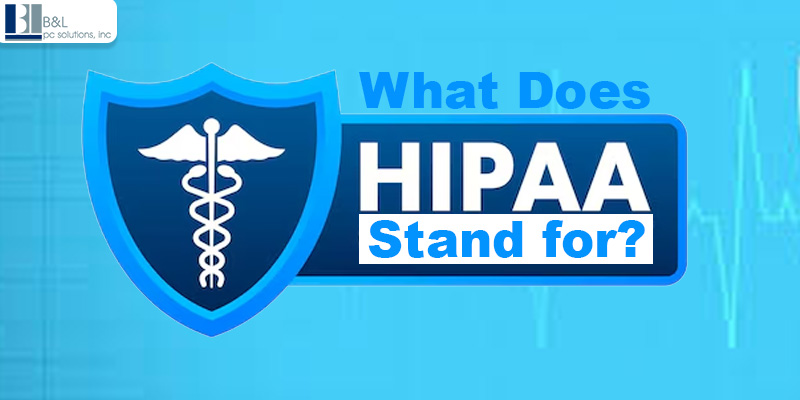
Today's healthcare industry should always follow the standards that control the safety of sensitive information. Protecting the patient's data from healthcare technology has become an essential idea. In all this, HIPAA steps serve a critical task. You must have a question here: What does HIPAA stand for? Why is it essential to the healthcare industry?
People, business colleagues, or data security professionals should know what HIPAA is and how it affects their organizational compliance perspective. This guide will explain HIPAA, the required rules around its compliance, and the Steps organizations can take to maintain compliance with its strict requirements.
What Does HIPAA Stand for?
HIPAA (Health Insurance Portability and Accountability Act) is a compliance made to conduct and preserve sensitive information of patients, which provides privacy and security of health data through national standards, giving secrecy and security of health data through national standards.
It controls healthcare providers, health plans, healthcare clearinghouses, and business professionals who deal with patient data. The HIPAA compliance industry ensures the safety of patient health information (PHI). But what else should the healthcare organization and its business partners do to live in conformity?
Why is HIPAA Important?
Ensuring HIPAA compliance protects patients' privacy and guarantees that the healthcare system has become competent in becoming efficient and reliable. Cyber threats and data violations are increasing, which requires the adoption of HIPAA as a risk structure for sensitive healthcare information. The results of non-compliance with HIPAA can incur penalties and legal cases; It can also ruin the organization's reputation. Under the law, patients can access their health information, request an amendment, and receive information about violations.
Ensure compliance with HIPAA in your organization. If you want to protect your health care information and follow the realities of HIPAA law, contact B&L PC Solutions today.
Our compliance experts will assist you in achieving HIPAA compliance and implementing the methodologies that ensure the safety of patient data.
Also Read: Is Zoom HIPAA Compliant?
HIPAA Compliance Rules
Now that we have established HIPAA, let's talk about compliance. The following rules are divided into parts addressing specific areas of protecting patient data.
1. Privacy Rules
Under HIPAA, privacy rules are established by the U.S. national standards that protect the identification of health information. Guidelines specifically regulate how healthcare providers, health plans, and professionals can use or disclose Protected Health Information (PHI) in their operations. The rule ensures that the patient's information is reported to authorized people only.
Privacy Rule Highlights:
- Patient Consent: Healthcare organizations must obtain patient consent to share their PHI.
- Notice of privacy practices (NPP): NPP requires healthcare providers to inform patients how PHI will be used.
- Patient rights: Patients can see and modify their records and request disclosure restrictions.
2. Security Rule
HIPAA Safety Rules were implemented to secure Electronic Protected Health Information (EPHI). This rule prevents unauthorized access, changes, and violations. These safety measures include administrative, physical, and technical safety measures.
Necessary aspects of safety rules:
- Administrative Safety Measures: Executive Training, Risk Analysis, Access Control, etc.
- Physical Safety Measures: Secure the physical environment of features where EPHI is maintained, including safe, lockable file cabinets and safe areas for server installation.
- Technical Safety Measures: Implementation of Access Control Mechanism for authentication to prevent unauthorized access to encryption, firewall, and EPHI.
3. Transactions and Code Set Rules
This rule standardizes the electronic exchange of health information to improve the efficiency of the healthcare system. It determines a unique medical diagnosis, procedure, or other health transaction code.
4. Identifier Rules
HIPAA Identification Rules provide healthcare providers, health plans, and employers with a unique identification number. These identifiers simplify healthcare transactions and reduce errors in processing claims and medical records.
5. Enforcement Rules
The HIPAA Enforcement Rules provide guidelines for investigating violations, implementing restrictions, and enforcing compliance. They also define the Department of Health and Human Services (HHS) 's responsibilities under HIPAA.
Some essential features of the enforcement rule:
- Penalties: HIPAA violations can cause civil and judicial punishment, depending on the severity of the breach.
- Audit: HHS HIPAA- conducts an audit to detect compliance with standards and implementation processes of related rules.
6. Breach Notification Rules
The Breach Notification Rules require healthcare organizations to inform patients whenever they violate PHI. This will include informing patients within 60 days of a breach and informing the Department of Health and Human Services.
HIPAA Compliance: Steps to Stay Compliant
Although it takes a lot to maintain it with all HIPAA compliance requirements, it is worth striving in the context of the patient's information and protection against the loss of heavy penalties.
Here are some guidelines that healthcare organizations must strictly follow:
- Conduct Regular Risk Assessments: Once evaluated, systematic risks related to PHI are regularly monitored. Risk analysis identifies weaknesses with significant gaps in safety measures and assesses serious compliance with HIPAA standards.
- Create privacy and security policies: Develop and apply strong policies to analog systems. Train employees to execute such policies and responsibilities.
- Implement Safeguards: Safety rules apply appropriate obstacles, such as encryption, access control, and audit, for all systems against illegal use.
- Apply a Breach Response Plan: Apply a breach response planning principle and ensure everyone knows how to include, identify, report, and react to PHI violations.
- Conduct Regular Training: Conduct regular training for employees related to HIPAA compliance. This means that healthcare providers and support staff understand their role in safeguarding PHI.
- Monitor and Audit: Regularly monitor and audit your system for potential PHI violations and signs of safety threats. Use the tool to track the PHI and ensure the appropriate access controls are in place.
FAQs
1. What is HIPAA? Why does it matter?
HIPAA is the US law that protects patient confidentiality by restricting or dictating the use of such information without the patient's knowledge and consent.
2. Who must comply with HIPAA?
HIPAA requires compliance by anybody who deals with or has access to protected health information (PHI), including healthcare providers, health plans, and business associates.
3. What are the penalties for breaking HIPAA?
HIPAA penalties can vary greatly depending on the level of negligence, with a maximum of $50,000 due for the most serious violations and a minimum of $100 for violations not perceived as negligent. Possible prosecution may be initiated in some instances.
4. Who is Protected by HIPAA?
Under HIPAA law, protected health information constitutes a person's identifiable health information, such as medical records, health insurance information, etc. HIPAA also protects corresponding health information.
5. How can I stay HIPAA compliant?
Continuous risk assessment, phishing security measures, staff training, and easy access to breach response plans would be implemented to remain HIPAA compliant. Continual surveillance and auditing to dispose of impending security threats would also be essential.
Concluding remarks
A conclusion would be the future of HIPAA compliance. However, with time, technology will also advance, as will HIPAA compliance. Secure patient data for the organizations and learn to adapt to the new rules. Understanding what HIPAA entails and the regulations about HIPAA compliance, as well as practicing what will be considered patient data security, will enable companies to create a safe and reliable environment for their patients and customers.
It is more than an obligation; it is a lifeline to the patients who care about them. Like all ethics in human conduct, it involves looking after the patients. The need for privacy and personal health information security is also a part of respecting an individual, which equally goes with excellent medical treatment to improve their health. Always protect your patients first. Every healthcare facility should learn to fully comply with all HIPAA rules because non-compliance can lead to hefty fines.
Let us help you with HIPAA compliance and make things easier for you. Call B&L PC solutions and start securing your healthcare operations today. Our professional services





